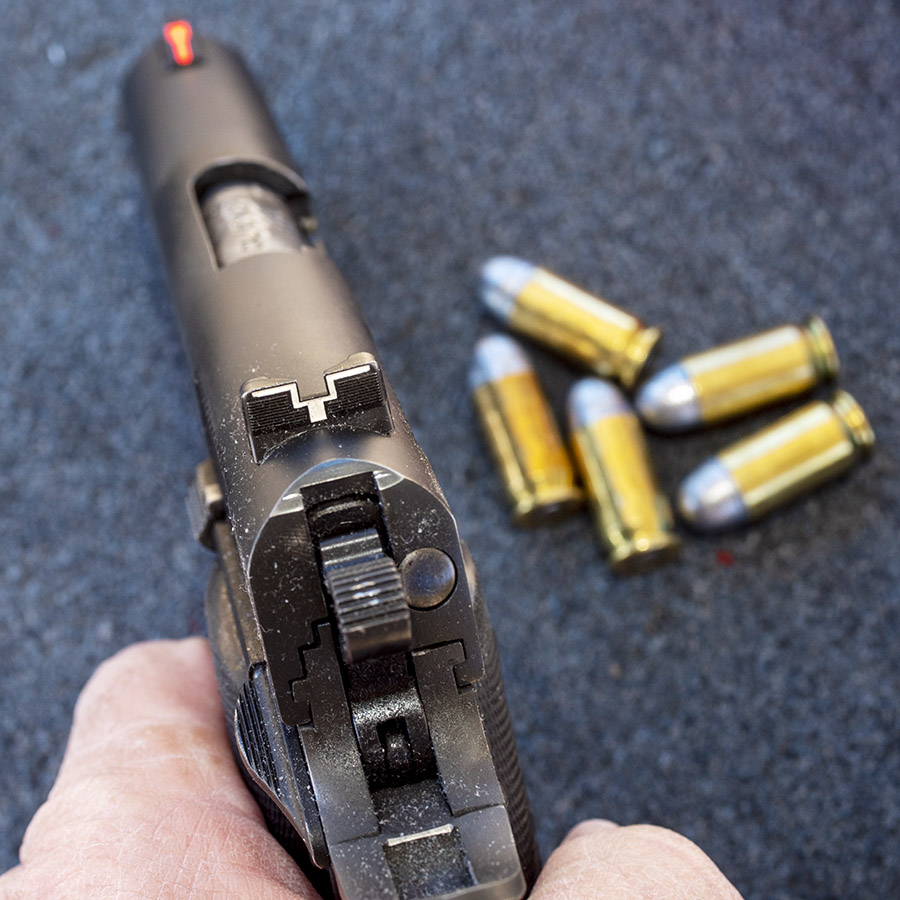I’ve done a few blogs on the 1911 handgun and, in particular, on a Rock Island Armory Compact I bought a couple of years ago. I love the Compact, it’s accurate enough, and it carries well. But I’ve had several issues with this handgun and because I’ve written about it before, I feel like I owe you an update.
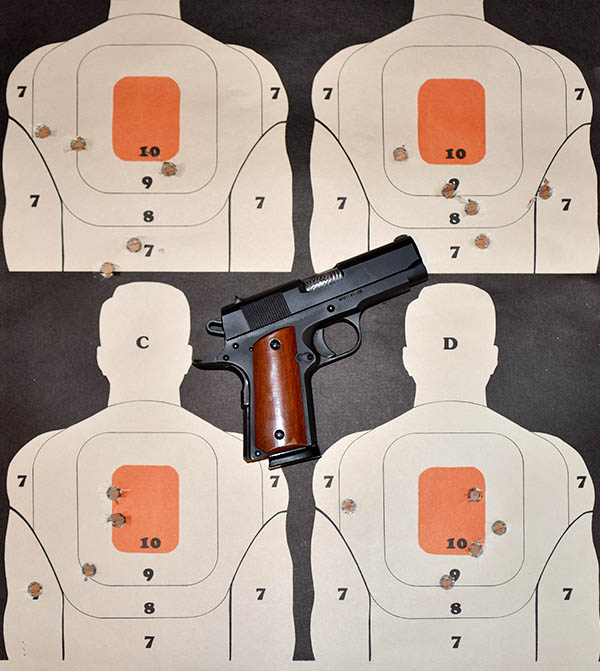
I’m going to share my experiences with you, but I want to make this point early on: I love my Rock Island Compact, and I would buy one again in a heartbeat. Yeah, it’s had problems, but let me make my point again: I’d buy another one in a heartbeat. I thought long and hard about doing a blog focused on the Compact’s failures, mostly because I’ve used the gun longer and harder than most. I’ve put several thousand rounds through the Compact, and nearly all have been full-power, hardball equivalent loads. Having said that, let’s get into it.
Firing Pin Stop Release
The first time I had the Compact on the range, it locked up a couple of times. The culprit? It was a weird one, something I had never encountered on a 1911 before. The firing pin stop was sliding off the firing pin.
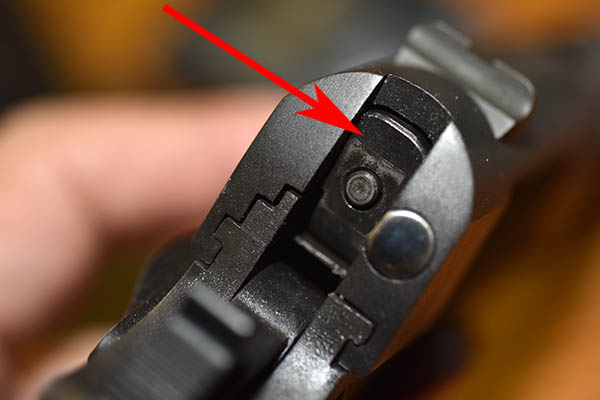
This fix for this one was easy. After removing the slide from the frame, I depressed the firing pin, pulled the firing pin stop, and then I pulled the firing pin and its spring from the slide. I stretched the firing pin spring just a bit, figuring it needed a little more oomph to push the firing pin back to hold the firing pin stop in place. After that, this failure never recurred.
Staked Front Sight Failure
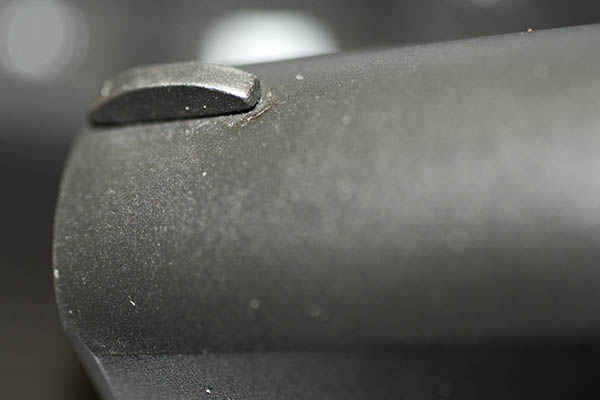
The front sight on my Compact came loose very quickly. That’s common enough on 1911s for staked sights (I’ve had it happen on a Colt 1911 and I’ve seen it happen on a couple of Springfield Armory 1911s, so it’s not a problem unique to the Rock Island handgun). If I was running Engineering at Rock Island, I’d specify a dovetailed front sight. The Compact replicates the look of the original Army 1911 (and I love that about the gun), but I think most purists like me would be willing to give up a tiny bit of the original GI look for a dovetailed front sight. Staked front sights on a 1911 (especially a Compact, which really gets knocked around by hardball-level recoil) are not a formula for long term reliability.
Rock Island made good on the front sight failure with their lifetime warranty. I sent the gun back and they fixed it, and the front sight is staying put.
Extraction and Ejection Failures
I had a ton of extraction and ejection issues. I sent the Compact back to Rock Island on the warranty and they fooled around with the extractor, but it still had extraction problems (at a lower frequency, but they still occurred). After the gun came back and I fired maybe another thousand rounds through it, the extractor broke so I replaced it with an aftermarket extractor (at my expense, because I didn’t want to send it back to Rock Island again). The nature of the failure indicated the extractor steel was too brittle.
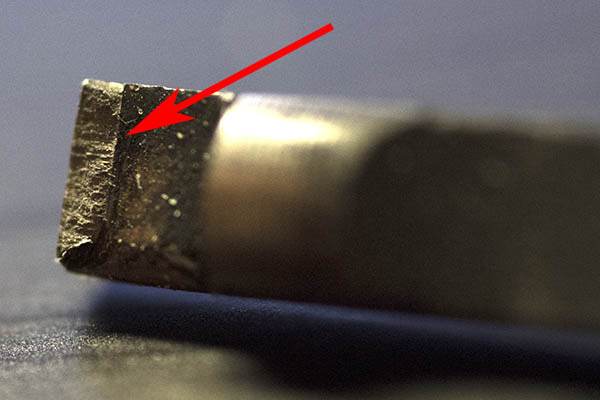
Ejection was flaky, too, and the gun frequently failed to eject the last round fired. It would stovepipe the brass as the slide went forward, and that brings me to another problem: The slide frequently would not lock to the rear after firing the last round. I mentioned that when I sent the gun back to Rock Island for the extraction issues, but they didn’t completely solve this problem, either. It got better, but it still occurred.
I then took the gun to a real gunsmith (good buddy TJ, about whom I’ve written before). TJ looked at the ejector and immediately recognized it was cut at the wrong angle. He recut it and the gun now ejects flawlessly. To state the obvious, you shouldn’t have to do this on a new gun.
Magazine Issues
Regarding the slide not locking back after firing the last shot in the magazine, that problem required a couple of fixes. One issue was the relationship between the magazine follower and the slide release. I bought two extra mags from Rock Island thinking (and hoping) that maybe I just had a bad magazine, but all three mags had the same problem. The magazine follower is supposed to push the slide release up after the last round is fired with enough force to lock the slide to the rear, but on my gun it wasn’t doing this reliably. I believe it was because one of the magazine follower bends is in the wrong place.
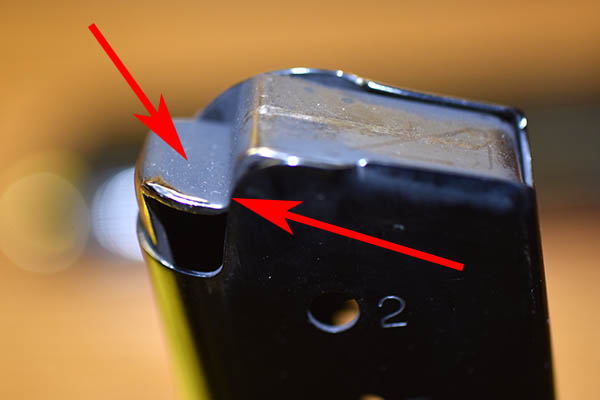
TJ addressed the magazine follower issue by welding a bead on the bottom of the slide release where it engages the magazine follower. That made sure the magazine exerted positive upward pressure on the slide release after the last shot, and that made a significant improvement. I think what Rock Island needs to do is modify the design of the follower bend, or better control the manufacturing process to make sure the follower bend is in the right place (it might be that the engineering drawing for the follower places the bend at the wrong location, or it might just be the magazine follower doesn’t meet the Rock Island drawing).
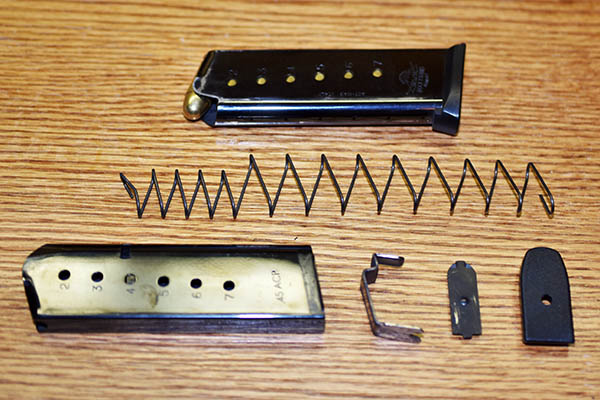
The other issue is that the magazine springs were wimpy. I pulled the springs and stretched them, reinstalled them in the magazines, and the problem disappeared. The slide now stays back after firing the last round every time.
Slide Deformation
I believe the slide material is too soft. This resulted in a big burr on the slide at the rear of the machined cutout for the slide release, which I ground off because it was scarring the inside of my leather holster and it just looked ugly. You can see the deformation in the photos below.
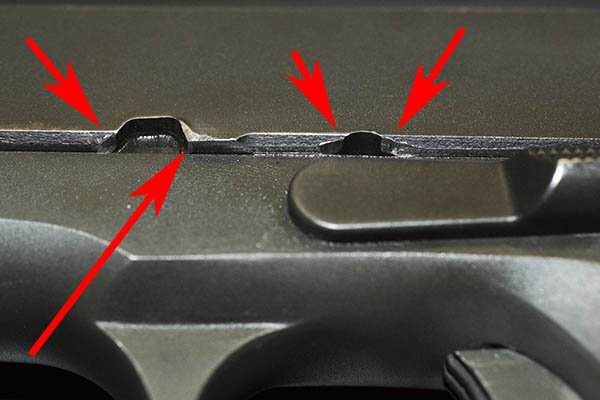
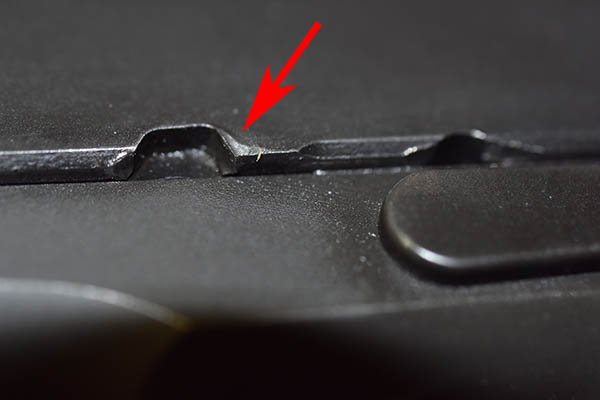
To some extent, a modest amount of slide material deformation is to be expected, and the problem is somewhat self-correcting. As metal deforms, it work hardens, and this natural work hardening tends to prevent further deformation. I’ve seen this occur on other 1911s I’ve owned (including one manufactured by Colt). I just saw way more of it than I expected on the Rock Island 1911.
Guide Rod Plug Failure
My most recent failure involved the guide rod reverse plug (I call it a bushing). I think this part failed because it was too hard (the fracture surface indicates a brittle failure); I’m guessing the heat treat made it too brittle. This part needs to be more ductile. I also think it is too thin in the area in which the failure occurred.
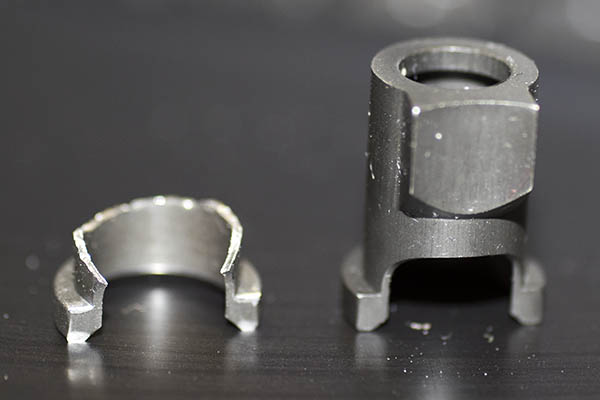
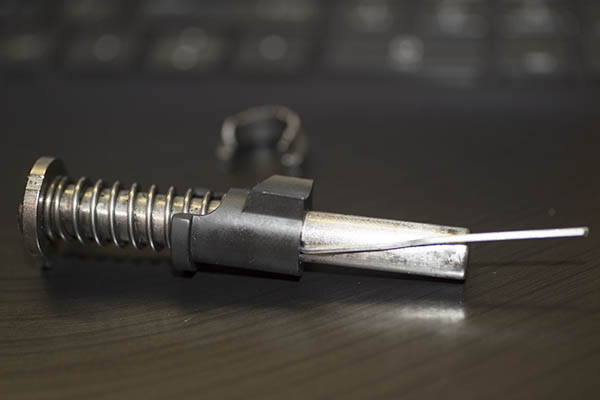


Poor Heat Treating Suspected
With the exception of the guide rod plug (which I think is a weak design) and the magazine follower, the issues described above are not faults in the basic design. I think they are being caused by inadequate heat treating process control. Heat treating was always a challenge in the defense plants I managed. To heat treat properly, you have to pull a partial vacuum to prevent hydrogen embrittlement, and it’s difficult (but not impossible) to get accurate temp readings in a partial vacuum. You think it’s one temperature, but actually it’s different temperatures at different locations in the heat treat oven. The result? You get parts harder or softer than specified on their respective drawings, which makes them more brittle or more ductile than they’re supposed to be. This issue of parts being too hard or too soft could be a contributor to the slide deformation issue, the front sight failure, the guide rod reverse plug failure, the extractor fracture, and the magazine and firing pin springs being too weak.
RIA Compact 1911: The Bottom Line
Yeah, I am putting more rounds through my Compact than most folks, who might get to the range once a month or more likely a couple of times a year. But the gun ought to be able to handle it. And yeah, the Compact has a lifetime warranty and the folks at Rock Island have been good about honoring it. I just wish I didn’t have to use it as often.
Having said the above, though, I’ll also tell you that new gun issues are not unique to Rock Island Armory. I’ve had to send three Rugers back for warranty service, my very expensive Smith and Wesson Performance Center revolver went back to Smith for repeated failures to fire (they took what I considered to be an inordinate amount of time to fix it), and my Springfield Armory M1A went back to Springfield for ejection issues (those guys took a long time, too). Two of my friends have Springfield Armory 1911s, and they both had to go back to Springfield for front sight failures (one of them had to go back twice because Springfield screwed up the repair). All of this has been in just the last few years. It’s unfortunate, but quality issues abound in the gun industry, and it seems like things are getting worse. When folks say they don’t make them like they used to, I can tell you from a lifetime of playing with things that go bang that’s true.
Help us keep the content coming: Please click on the popup ads!
I should also tell you that one of my good buddies tried my Compact, liked it, and he bought one. He hasn’t had any issues with his. None. Zip. Nada. So I can’t say my experience is representative of what you might expect. I’m only telling you what I experienced.
All the above notwithstanding, I’m happy with my Rock Island Armory Compact 1911 and like I said above, I love the gun. I’ve fixed the thing so many times that the Rock and I have what you might call an intimate relationship. We know each other. Like Gresh said about his relationship with the Royal Enfield Bullet, my Rock Island 1911 needs me.
You might wonder: Why not just buy a compact 1911 from a higher-end supplier, like Springfield, Kimber, Sig, or one of the custom builders like Les Baer or Wilson? Well, in a word, price. These other compacts start at roughly twice what the Rock costs (and go up sharply from there), and there’s no certainty they wouldn’t have problems, too. You could argue that you get what you pay for, and my response to that would be: Sometimes.
You can buy Rock Island 1911s for $499 all day long, and I’ve seen them on sale for as little as $429. That’s a great deal on a new 1911. I’ve had to work my way through the issues outlined above, but my Rock Compact is extremely reliable now and it’s a constant companion. Someday I may wear it out completely and if that ever happens, I’d just buy another one. If something goes wrong, odds are I’ll know how to fix it.
Why you should click on those popup ads!
Read our other reports on the Rock Island Compact 1911 (and many more interesting firearms) on our Tales of the Gun page.
Never miss an ExNotes blog:
Click on those popup ads and help us keep the lights on!

